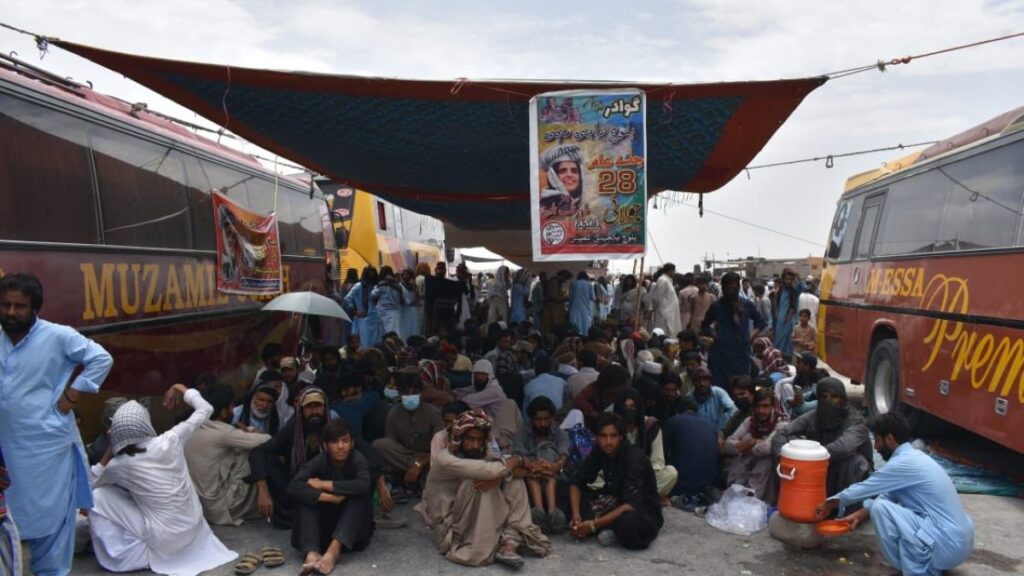Islamabad, Pakistan — Tensions are high in Pakistan’s port city of Gwadar in the southwestern Balochistan province where an ethnic Baloch group has been protesting for days, following the arrests of some of their members and deadly clashes with security forces.
Gwadar is Pakistan’s only deep-sea port on the Arabian Sea, and is a key route of the $60bn China-Pakistan Economic Corridor (CPEC).
The latest tensions in the port city began on Friday after the Baloch Yakjehti Committee (BYC) gave a call to demonstrate against alleged human rights violations, enforced disappearances and extrajudicial killings of people in Balochistan, Pakistan’s largest and poorest province.
Home to approximately 15 million of Pakistan’s estimated 240 million people, according to the 2023 census, Balochistan is rich in natural resources, including oil, coal, gold, copper, and gas reserves, which generate substantial revenue for the federal government.

The ethnic Baloch allege that the Pakistani state has neglected their community and exploited the province’s mineral resources. The anger fuelled separatist sentiments, with the province witnessing at least five rebellion movements since the formation of Pakistan in 1947.
The latest wave of rebellion began in the early 2000s to demand a larger share of the province’s resources and even calls for complete independence. The Pakistani security forces have since launched a severe crackdown on the rebellion, killing thousands of people in the last two decades.
Gwadar, due to its economic prominence, has been a hotbed of violence by armed and separatist groups, the latest being in March this year, when eight men tried to enter the Gwadar Port Authority complex before they were killed by security officials.
Arrests and blockades
On Sunday, the BYC called for a “Baloch Rajee Muchi”, or Baloch National Gathering, in Gwadar. However, as convoys from different parts of the vast province made their way to the city, law enforcement officials started blocking major highways that lead there, resulting in clashes in some places.
The BYC claims security forces opened fire during one such clash on Saturday in Mastung district, killing one person and wounding several others.
“The paramilitary force opened fire on a convoy comprising hundreds of people, including women and children, who were travelling from Quetta to Gwadar,” BYC representative Bebarg Baloch told Al Jazeera.
In a statement on Monday, the Pakistani military said one of its soldiers was also killed in the “unprovoked attacks by a violent mob” and 16 other soldiers were injured.
Dozens of Baloch were arrested by security forces during the clashes as mobile and internet services were suspended in Gwadar for a fifth consecutive day on Wednesday.
The BYC said two of their prominent leaders, Sammi Deen Baloch and Sabiha Baloch, were picked up by the authorities in Gwadar on Monday and their whereabouts are unknown.
Angry protesters gathered in other towns in the province as well, including provincial capital Quetta, Kech and Mastung to demand their release.

Meanwhile, BYC leader Mahrang Baloch issued a statement late on Sunday night, outlining two main demands: the opening of highways to allow the Baloch protesters to reach Gwadar, and the release of dozens of their members arrested by law enforcement agencies since last week.
Speaking to a crowd of hundreds in Gwadar that night, Mahrang, 31, said the people of Gwadar had come out in large numbers to resist “state oppression”.
“The state and its institutions have attempted to prevent us from holding this gathering by blocking highways and arresting our people, but today the entire Gwadar is here to send a message: we will not tolerate further oppression of the Baloch nation,” she said.
“I know I may be the next target of this state, but unity is our strength, and we must remain united.”
BYC member Sadia Baloch told Al Jazeera from Quetta on Tuesday that they will continue to protest until all those arrested are released.
“We have thousands of people protesting all over in Balochistan who were stopped by authorities from travelling to Gwadar,” she told Al Jazeera. “Sammi and Sabiha were picked up from a sit-in and we don’t know where they are. Nobody from local authorities is giving a response.”
Al Jazeera reached out to local authorities and government officials in Gwadar and Quetta, but did not get any response.
‘Repeated punitive crackdowns’
Balochistan’s Chief Minister Sarfraz Bugti on Monday slammed the protests.
“We were offering them space to hold a rally elsewhere, but they refused and remained adamant to hold it in Gwadar. The purpose behind this chaos is to sabotage all the development and progress that the province has seen,” he said from inside the state assembly.
Bugti said that while the citizens have a right to assemble, they should not have the “intentions to disrupt peace and order”.
But rights group Amnesty International on Tuesday accused the authorities of trying to “vilify and criminalise peaceful protesters”.
“Every time Baloch protests take place, their demands are met with violence by security forces and mass arrests,” it said in a statement shared with Al Jazeera, demanding that “repeated punitive crackdowns” on Baloch protests must end.
“Amnesty International calls for an end to the brutal crackdown on the Baloch protests and the immediate and unconditional release of all those arrested for exercising their right of peaceful assembly,” it said.
The Human Rights Commission of Pakistan (HRCP) also criticised the “unnecessary” use of force against Baloch protesters and the suspension of internet and mobile services.
“They should constitute a high-level parliamentary delegation to meet with Baloch representatives and listen carefully to their demands,” it said in a statement.
Additional reporting by Saadullah Akhter from Quetta.
https://www.aljazeera.com/news/2024/7/31/why-protest-by-ethnic-baloch-has-put-pakistans-key-port-of-gwadar-on-edge?traffic_source=rss


